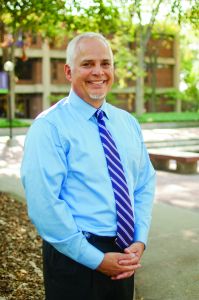What matters most: the birds and the bees and passionate…learning

As a boy growing up in the Appalachian Mountains of Pennsylvania, Merle E. Jacobs ’48 loved all birds but was obsessed with yellow canaries. From a pair, he eventually developed a flock of 67 canaries – all happily living inside his family’s home.
Fifty years later, I had the privilege of studying genetics under Professor Merle E. Jacobs at Goshen College. He was still obsessed with canaries and other birds, but he had branched out, developing expertise in the genetics of aging in fruit flies. He loved fruit flies almost as much as canaries and almost as much as current Assistant Professor of Biology Andy Ammons loves honeybees. If you haven’t stood in the midst of thousands of bees swarming all around, while Dr. Ammons gives a lecture on the sex lives of bees, you haven’t been on the edge of learning!
Professor Jacobs embodied, as Assistant Professor Ammons still embodies, the college’s core value of Christ-centered passionate learning – the core value we are celebrating and examining this academic year. Countless Goshen alumni live that value, as evidenced in many of the articles and news notes in this issue of the Bulletin.
At our opening convocation this fall, I told students that one of the questions they surely would be asked during post-graduation job interviews would be, “What are you passionate about?” Indeed, in his best-selling book, Corner Office, Adam Bryant interviewed more than 700 CEOs and asked them: “What qualities do you see most often in those who succeed?” Their overwhelming response was “passionate curiosity.”
Yet while being a passionate learner is a prerequisite today, in the Western philosophical tradition, the juxtaposition of passion with learning was damnable. Passion, or pathos, was associated with intense suffering, as in “the passion of Christ.” Indeed, for nearly 2,400 years in learning circles, from Plato to Kant, the idea of passion or pathos was considered a counterpoint to thinking or learning, like two magnetic learning poles repelling each other. And for nearly 2,000 years, Christian and Jewish theologians were embarrassed by the God portrayed in Scripture – a God of passion; sometimes angry, sometimes elated, sometimes jealous, sometimes forgiving, at times weeping, showing compassion, intimate and personal.
So when Goshen College proclaims that one of our core values is passionate learning, it is a wonderful, amazing confession that goes against the grain of the old Western learning tradition and reclaims a missing piece, supported by Scripture, of a truly comprehensive liberal arts education. Fortunately, over the past 60 years, there is a new story of amazing new learning styles and methods that include a range of human experience.
For example, although Albert Einstein was a theoretical physicist, his passions were sailing, playing his violin, smoking his pipe and building houses of cards. These experiences sparked his creative imagination. Einstein even said his musical perception provided the creative force behind his greatest insight, the theory of relativity.
At Goshen College, I marvel at the many gifted and hard-working individuals who pursue their passions: Professor of Physics John Buschert studies the connection between the physics of sound and the shapes of bells; Professor of Bible, Religion and Philosophy Jo-Ann Brant’s love of drama and movies led her to an amazing new way of reading St. John’s gospel; and Rocio Diaz, community outreach coordinator for the Center for Intercultural and International Education (CIIE), has pursued a bachelor’s degree at Goshen College (and maintained a 3.7 GPA) while working full time, putting her two daughters through this college and taking classes in her second language. Now that’s a passion for learning involving all senses.
When Jesus claimed that all of Scripture could be summed up in two phrases, the first of the two, pretty much defines, theologically, the meaning of being passionate: “You shall love the Lord your God with all your heart, with all your soul, with all your mind and with all your might.” Jesus used the word love and added intensity to it. Love combines with passion to multiply endurance, discipline and self-sacrifice – essential ingredients needed to succeed at Goshen College and for the rest of one’s days.
– Dr. James E. Brenneman, President of Goshen College




